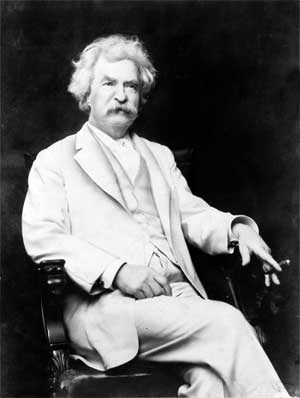Cigars in Classic Literature: Mark Twain's Disdain for Snooty Smokers
Posted by Corona Cigar Co. on Nov 2 2016

Cigars in Classic Literature: Mark Twain's Disdain for Snooty Smokers
In 1893 (scholars approximate), just before a beautiful and metaphorical write on queen bees and the problem with scientists, Mark Twain wrote an essay titled, "Concerning Tobacco."
"As concerns tobacco, there are many superstitions," he began; "and the chiefest is this--that there is a STANDARD governing the matter, whereas there is nothing of the kind. Each man's own preference is the only standard for him, the only one which he can accept, the only one which can command him" (capitalization in original).
The father of American literature then continued, in what reads in 2016 far more like a Facebook tirade than an academic essay, to berate snooty smokers everywhere. They go by brand rather than flavor and can be easily duped, Twain argued, just before describing a prank (or was it a scientific experiment?) in which he proved his point by replacing his own favorite, budget cigars with the cigars of his fanciest friend. While his friends struggled to smoke what were in fact pricey cigars in a mislabeled box, Twain laughed inwardly.
According to Twain, in their efforts to avoid smoking down (like dating or marrying down), his friends smuggled their own preferred smokes, tucked into pockets, to his dinner parties, while Twain, too, smuggled his favorite (albeit the unshowy) cigars past his unsuspecting hosts. Twain's point: to each his own.
Famed as an individualist, whose classic novels were witty and wry but also hyper-Americanist (think Darwinian pull-yourself-up-by-the-bootstraps ideologies set in Middle America), Twain was as committed to practices of rugged individualism in smoking as he was in business and politicking. This commitment infected a multiplicity of his speaking and writing engagements.
"If I cannot smoke in heaven, than I shall not go," Twain famously quipped. But at times Twain's humor was replaced with a sentiment that reads of anger, frustration, and exasperation with industry critics:
You are blind to the fact that most old men in America smoke and drink coffee, although, according to your theory, they ought to have died young; and that hearty old Englishmen drink wine and survive it, and portly old Dutchmen both drink and smoke freely, and yet grow older and fatter all the time. And you never try to find out how much solid comfort, relaxation, and enjoyment a man derives from smoking in the course of a lifetime (which is worth ten times the money he would save by letting it alone), nor the appalling aggregate of happiness lost in a lifetime by your kind of people from not smoking (From "The Moral Statistician," 1893).
"Concerning Tobacco," like "The Moral Statistician," was a social critique with implications meant to resonate far beyond the tobacco industry and with a target audience that stretched far beyond tobacco opponents. Just before concluding that work, Twain returned to the humor via acuteness for which he is remembered and revered, and it is with these words and a subtle smile that I will leave you:
"To say true, my tastes are so Catholic that I have never seen any cigars that I really could not smoke, except those that cost a dollar apiece. I have examined those and know that they are made of dog-hair, and not good dog-hair at that" (Twain 1893).
Contact Corona Cigar Co. for more information on cigars, cigar accessories, etc.
